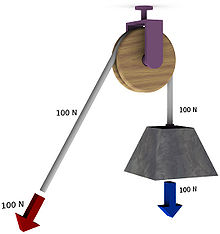pulley
See also: Pulley
English

Etymology
From Middle English polley, pullie, from Old French poulie, polie (“a pulley, windlass”), (compare Medieval Latin polea, polegia, polegium, Middle Dutch puleye, modern Dutch poelie), of obscure origin. Perhaps connected to Middle Low German pulen (“to pull”), Old English pullian (“to pull”) [1][2][3]. More at pull.
Alternatively, perhaps connected to Ancient Greek πόλος (pólos, “pivot, hinge, axis”), from Proto-Indo-European *kʷel- (“to turn”).
Pronunciation
Noun
pulley (plural pulleys)
- (engineering, countable) One of the simple machines; a sheave, a wheel with a grooved rim, in which a pulled rope or chain lifts an object (more useful when two or more pulleys are used together, as in a block and tackle arrangement, such that a small force moving through a greater distance can exert a larger force through a smaller distance).
Derived terms
Translations
one of simple machines
|
References
Verb
pulley (third-person singular simple present pulleys, present participle pulleying, simple past and past participle pulleyed)
- (transitive) To raise or lift by means of a pulley.
- (Can we find and add a quotation of Howell to this entry?)
Hypernyms
Hyponyms
Meronyms
Coordinate terms
Categories:
- English terms inherited from Middle English
- English terms derived from Middle English
- English terms derived from Old French
- English terms with unknown etymologies
- English terms derived from Middle Low German
- English terms derived from Old English
- English terms derived from Ancient Greek
- English terms derived from Proto-Indo-European
- English 2-syllable words
- English terms with IPA pronunciation
- English terms with audio pronunciation
- Rhymes:English/ʊli
- English lemmas
- English nouns
- English countable nouns
- en:Engineering
- English verbs
- English transitive verbs
- Requests for quotations/Howell
- en:Simple machines
